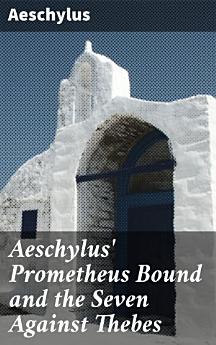Aeschylus' Prometheus Bound and the Seven Against Thebes: Enriched edition. Defiance, Fate, and the Struggle with Gods: Epic Greek Tragedies
Aeschylus
Nov 2019 · Good Press
Ebook
172
Pages
family_home
Eligible
info
reportRatings and reviews aren’t verified Learn More
About this ebook
Aeschylus' "Prometheus Bound" and "Seven Against Thebes" are seminal works that explore the themes of fate, justice, and the human condition through powerful symbolism and profound moral dilemmas. "Prometheus Bound" portrays the titan Prometheus as a champion of humanity, defying Zeus to impart the gift of fire, thus sparking the eternal struggle between divine authority and individual freedom. In contrast, "Seven Against Thebes" depicts the tragic conflict of Oedipus' sons, Eteocles and Polyneices, focusing on themes of family loyalty and the inescapability of fate. Aeschylus' distinctive use of language blends archaic grandeur with stark realism, situating his works in the rich context of Greek tragedy, which grapples with the consequences of human actions against divine will. Aeschylus, often referred to as the 'Father of Tragedy,' was a playwright who lived during the 5th century BCE, an era marked by intense philosophical inquiry and social change in Athens. His own experiences in the Persian Wars and the struggles of his time influenced his thematic focus on destiny and ethical conduct. With a deep commitment to dramatizing the human experience, Aeschylus sought to engage audiences with complex characters facing moral choices that resonate across time. This collection is a compelling read for anyone interested in the foundations of Western literature and the exploration of timeless philosophical questions. It offers a rare glimpse into human resilience and consequence, inviting readers to reflect on the nature of justice and the moral complexities within their own lives. Engaging with these texts will not only enhance one's understanding of ancient drama but also illuminate the shared dilemmas that continue to shape humanity. In this enriched edition, we have carefully created added value for your reading experience: - A comprehensive Introduction outlines these selected works' unifying features, themes, or stylistic evolutions. - The Author Biography highlights personal milestones and literary influences that shape the entire body of writing. - A Historical Context section situates the works in their broader era—social currents, cultural trends, and key events that underpin their creation. - A concise Synopsis (Selection) offers an accessible overview of the included texts, helping readers navigate plotlines and main ideas without revealing critical twists. - A unified Analysis examines recurring motifs and stylistic hallmarks across the collection, tying the stories together while spotlighting the different work's strengths. - Reflection questions inspire deeper contemplation of the author's overarching message, inviting readers to draw connections among different texts and relate them to modern contexts. - Lastly, our hand‐picked Memorable Quotes distill pivotal lines and turning points, serving as touchstones for the collection's central themes.
Rate this ebook
Tell us what you think.
Reading information
Smartphones and tablets
Install the Google Play Books app for Android and iPad/iPhone. It syncs automatically with your account and allows you to read online or offline wherever you are.
Laptops and computers
You can listen to audiobooks purchased on Google Play using your computer's web browser.
eReaders and other devices
To read on e-ink devices like Kobo eReaders, you'll need to download a file and transfer it to your device. Follow the detailed Help Center instructions to transfer the files to supported eReaders.








